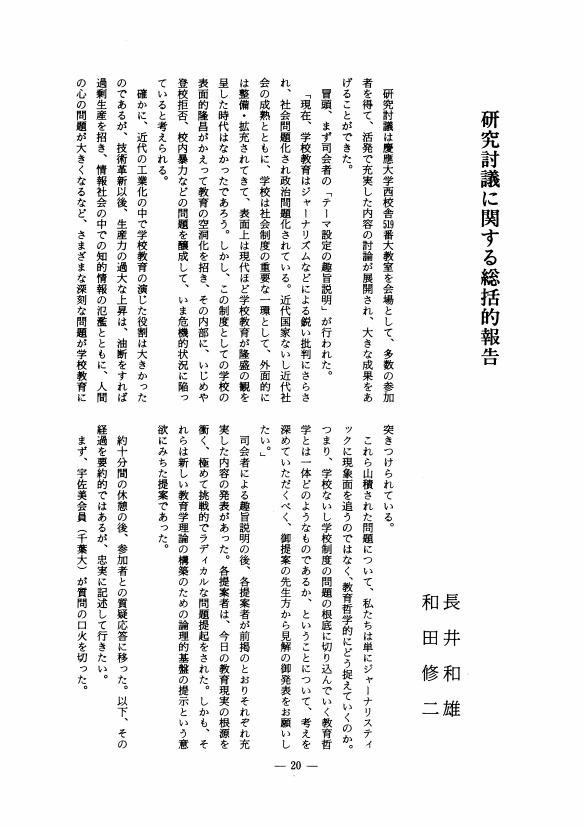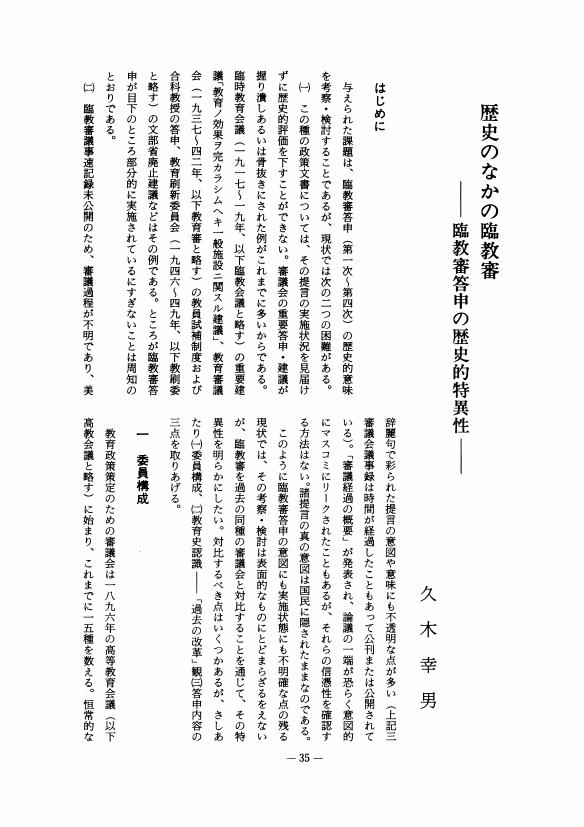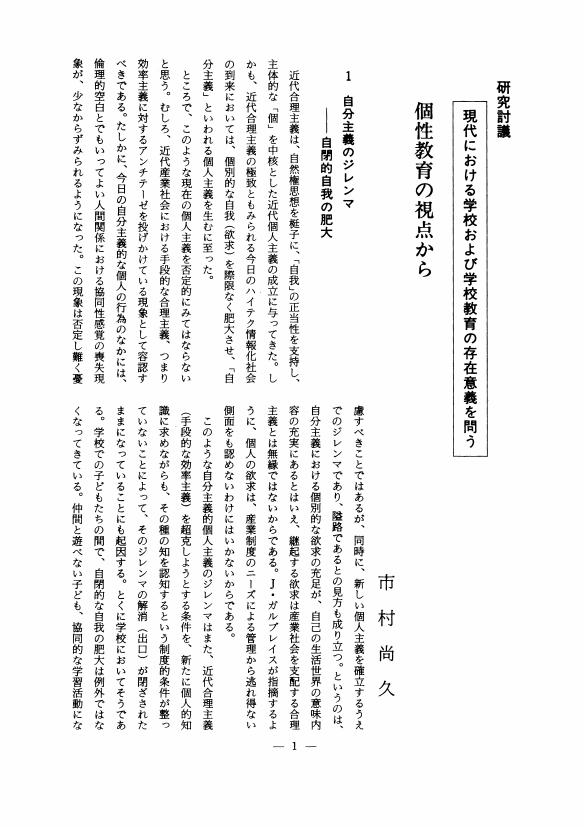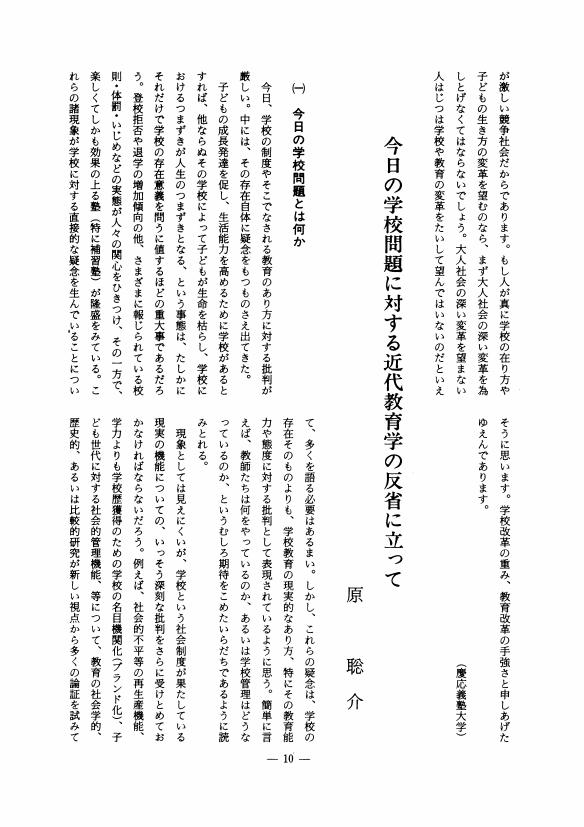1 0 0 0 OA 理念なき時代のビルドゥング グァルデイーニのビルドゥング論における「弁証法」の問題
- 著者
- 桜井 佳樹
- 出版者
- 教育哲学会
- 雑誌
- 教育哲学研究 (ISSN:03873153)
- 巻号頁・発行日
- vol.1989, no.60, pp.29-41, 1989-11-10 (Released:2009-09-04)
- 参考文献数
- 25
Dieser Aufsatz versucht die Konstituierung von Bildung in der philosophischen Bildungslehre von R. Guardini zu beleuchten. Als Zweifel bezüglich an dem überkommenen neuhumanistischen Bildungsideal aufbrachen, verlor man auch jedes bestimmte Erziehungsziel und war nun gezwungen, über Bildung neu nachzudenken.Guardini berührt diese Problematik dort, wo er das 'Pädagogisch-Eigentliche' zu erfragen sucht. Dieses sei im dialektischen Ineinander der drei Momente, (1) 'Bild und Bildung' : (2)'Begegnung und Bewahrung' : (3)'Das Gegenständliche und der Dienst', gegeben. Dabei ständen das erste und zweite Moment so zueinander, daß das eine die Grenze und Zerstorungsmoglichkeit des anderen deutlich werden lasse. Beide wiederum ständen mit dem dritten Moment im Verhältnis einer dialektischen Spannung. Die Frage nach dem Pädagogisch-Eigentlichen' müsse im Schnittpunkt der Spannung (im Perspe-ketivpunkt') ansetzen und sei dort zu stellen.Der zweite Teil des Aufsatzes sucht den Widerhall zu orten, den die skizzierte Bildungslehre Guardinis bei den zeitgenossischen Padagogen hervorgerufen hat. In der Auseinandersetzung mit ihnen zeigt sich die Notwendigkeit, die dialektische Struktur der Guardinischen Gedanken, seine Gegensatzlehre, noch einmal hervorzuheben, urn zu betonen, daß nicht ein einziges Moment seiner Bildungslehre monopolisiert werden kann. Implizit würde daraus auch die Kratik Guardinis am neuhumanistischen Bildungsansatz folgen, welcher das erste Moment verabsolutiert.
1 0 0 0 OA ランゲフェルド教育学における現象学的方法の課題
- 著者
- 渡辺 英之
- 出版者
- 教育哲学会
- 雑誌
- 教育哲学研究 (ISSN:03873153)
- 巻号頁・発行日
- vol.1989, no.60, pp.42-55, 1989-11-10 (Released:2010-01-22)
- 参考文献数
- 34
Will man beurteilen, oh sich die Phänomenologie als fruchtbare Arbeitsmethode in die Pädagogik einführen läßt, dann wird man mindestens drei Fragen prüfen müssen : 1. Welche methodischen Komponenten konstituieren die grundlegende phänomenologische Intention?2. Welches Verständnis von Phanomenologie hat eine pädagogische Relevanz?3 Wie muß die phänomenologische Methode im Hinblick auf die pädagogischen Bedingungen revidiert werden?Der vorliegende Aufsatz versucht, anhand dieser drei Frages die Moglichkeit einer phänomenologischen Pädagogik zu klären. Dabei wird vor allem die Methodologie in Langevelds pädagogischen Schriften untersucht, die auf verschiedenen Stufen die phänomenologische Methode im Hinblick auf die Pädagogik entfalten. Es wird gezeigt, daß Langeveld mit seiner “Anthropologie des Kindes” die Erziehungssituation nicht nur genetisch beschreibt, sondern daß er die Methode der Anthropologie des Kindes von der bloBen phänomenologischen Beschreibung zu einer Umgestaltung der Erziehungssituation radikalisiert. Es wird aufgewiesen, daß Langevelds Methode zu einer phänomenologischen Pädagogik führt, die auf dem heranwachsenden Kind und dem lebendigen Bezug zwischen Erzieher und Kind beruht, und daß diese Methode pädagogisch fruchtbar entfaltet wird.
1 0 0 0 OA 教育哲学を考える
- 著者
- 東岸 克好
- 出版者
- 教育哲学会
- 雑誌
- 教育哲学研究 (ISSN:03873153)
- 巻号頁・発行日
- vol.1989, no.60, pp.56-57, 1989-11-10 (Released:2009-09-04)
1 0 0 0 OA 生活世界の教育理論の射程
- 著者
- 中井 孝章
- 出版者
- 教育哲学会
- 雑誌
- 教育哲学研究 (ISSN:03873153)
- 巻号頁・発行日
- vol.1989, no.60, pp.58-63, 1989-11-10 (Released:2009-09-04)
- 参考文献数
- 5
1 0 0 0 OA デイドロの能力観と教育の諸相
- 著者
- 田沼 光明
- 出版者
- 教育哲学会
- 雑誌
- 教育哲学研究 (ISSN:03873153)
- 巻号頁・発行日
- vol.1989, no.60, pp.63-68, 1989-11-10 (Released:2010-05-07)
- 参考文献数
- 12
1 0 0 0 OA 研究討議に関する総括的報告
- 著者
- 長井 和雄 和田 修二
- 出版者
- 教育哲学会
- 雑誌
- 教育哲学研究 (ISSN:03873153)
- 巻号頁・発行日
- vol.1989, no.59, pp.20-24, 1989-05-10 (Released:2009-09-04)
1 0 0 0 OA 思想構造からのアプローチ
- 著者
- 岡本 道雄
- 出版者
- 教育哲学会
- 雑誌
- 教育哲学研究 (ISSN:03873153)
- 巻号頁・発行日
- vol.1989, no.59, pp.25-29, 1989-05-10 (Released:2009-09-04)
- 参考文献数
- 8
1 0 0 0 OA 制度方面の面から 「教育改革」が教育問題の解決に貢献する可能性について
- 著者
- 小川 博久
- 出版者
- 教育哲学会
- 雑誌
- 教育哲学研究 (ISSN:03873153)
- 巻号頁・発行日
- vol.1989, no.59, pp.29-34, 1989-05-10 (Released:2009-09-04)
1 0 0 0 OA 歴史のなかの臨教審 臨教審答申の歴史的特異性
- 著者
- 久木 幸男
- 出版者
- 教育哲学会
- 雑誌
- 教育哲学研究 (ISSN:03873153)
- 巻号頁・発行日
- vol.1989, no.59, pp.35-39, 1989-05-10 (Released:2009-09-04)
- 参考文献数
- 10
1 0 0 0 OA 課題研究に関する総括的報告
- 著者
- 田浦 武雄
- 出版者
- 教育哲学会
- 雑誌
- 教育哲学研究 (ISSN:03873153)
- 巻号頁・発行日
- vol.1989, no.59, pp.40-43, 1989-05-10 (Released:2009-09-04)
1 0 0 0 OA ヘルバルトにおける啓蒙主義の視点
- 著者
- 浜田 栄夫
- 出版者
- 教育哲学会
- 雑誌
- 教育哲学研究 (ISSN:03873153)
- 巻号頁・発行日
- vol.1989, no.59, pp.44-58, 1989-05-10 (Released:2009-09-04)
- 参考文献数
- 35
The Enlightenment constitutes one of the dominant tendencies of intellectual life in eighteenth century Europe. Though the Enlightenment was soon rejected by Romanticism, especially in Germany, some individuals continued to develop the Enlightenment further with a critical point of view. One of them is Kant who developed the viewpoint of the Enlightenment through the three Critiques - the Critique of Pure Reason (1781), the Critique of the Practical Reason (1788) and the Critique of Judgement (1790) - in the field of philosophy, and another is Herbart who developed the same point of view in the field of education.For Herbart, therefore, the problem of the Enlightenment resolves itself into a theory of education. We can re-examine what is meant by ' Regierung' and 'Unterrichr' the two terms which characterize the pedagogy of Herbart, from the viewpoint of the Enlightenment. Moreover, Herbart attempts further to integrate intuition and understanding under the influence of Kant's 'aesthetic judgement'. We may interpret his attempts at integration under the following themes : 1. The close relation between the ABC of intuition and mathematics ;2. The formation and development of aesthetic judgement ;3. The synthesis of theory and practice and educational tact.We may say, by way of conclusion, that man connot understand the philosophy and the educational thought of Herbart without considering his viewpoint of the Enlightenment.
1 0 0 0 OA ジョン・ロックの習慣形成=教育論の特質 身体・意志・知性の関連構造の視点から
- 著者
- 鈴木 剛
- 出版者
- 教育哲学会
- 雑誌
- 教育哲学研究 (ISSN:03873153)
- 巻号頁・発行日
- vol.1989, no.59, pp.59-73, 1989-05-10 (Released:2010-05-07)
- 参考文献数
- 24
Habit formation constitutes an essential viewpoint in John Locke's educational theory. It exercises an influence not only on his educational thought but also on his philosophy and epistemology. In this paper the author has attempted to clarify this theory of habit formation by analyzing Locke's three concepts of body, will and understanding.According to Locke's theory habit is nothing but the habit of Conduct, and Conduct as such is closely related to the body and bodily action as well as to the Understanding. In Locke's “On the Conduct of Human Understanding” (1697) he interprets education as Habit formation, 'obedience of the will to the dictates of Understanding'. Hence it becomes necessary for us to understand the function of will by way of analyzing the 21st chapter, 'On Power', in the second volume of Locke's “An Essay Concerning Human Understanding.” In this book, Locke argues that Will - a spiritual like Understanding - is determined by Uneasiness, Desire, i. e. by Passions. Therefore, in this paper the focus is turned on Locke's Concept of Passions of innate practical principles.
1 0 0 0 OA H・ブランケルツの「一般陶冶」概念の特質
- 著者
- 藤川 信夫
- 出版者
- 教育哲学会
- 雑誌
- 教育哲学研究 (ISSN:03873153)
- 巻号頁・発行日
- vol.1989, no.59, pp.74-87, 1989-05-10 (Released:2010-01-22)
- 参考文献数
- 42
Ever since the beginnings of modern education, the problem of integrating general education and vocational education has been called an aporia. This paper examines Blankertz's concept of general education which is looked upon as the most recent attempt within the discussions carried on continuously in Germany since the beginning of this century in an attempt to solve the problem. On the one hand, like earlier representatives of the integration theory, he tries to overcome the one-sidedness of the 'special education formation process' which constitutes the unifying point of both general and vocational education, by placing it into a general context including this science; on the other hand, he realizes the necessity of critical self-examination on the part of the pupil himself concerning the vocation related to this formation process and the necessity to take into account the individual character of the pupil choosing that particular vocation. That constitutes the characteristic point in Blankertz's theory.
- 著者
- 山名 淳
- 出版者
- 教育哲学会
- 雑誌
- 教育哲学研究 (ISSN:03873153)
- 巻号頁・発行日
- vol.1989, no.59, pp.88-101, 1989-05-10 (Released:2009-09-04)
- 参考文献数
- 52
In this paper the problems around 'Mündigkeit' which forms the central idea underlying Kant's question, “what is enlightenment?” are examined. As a result it becomes clear that in his famous statements dealing with the definition of enlightenment, while he had the strong desire to deal consciously with enlightenment, yet on the other hand he felt some anxiety caused by the difficulty involved in such an attempt. It seems that this anxiety was connected with the tension between ' Mündigkeit' on one side and the guarding act on the other side (guarding on one hand was aimed at ' Mündigkeit', on the other hand, however guarding may include the possibility of suppressing 'Mündigkeit').Furthermore, this uneasiness of Kant is also part of his educational theory which belongs to what is generally admitted to have been the eighteenth century optimistic view on education. The author argues that Kant suggests that the person engaged in education as well as the person talking about education may possibly suppress the 'Mündigkeit' of other persons and that this anxiety became a major factor causing a certain inconsistency in his statements on education.
1 0 0 0 OA 堀内 守編『教育哲学の諸問題』
- 著者
- 杉浦 宏
- 出版者
- 教育哲学会
- 雑誌
- 教育哲学研究 (ISSN:03873153)
- 巻号頁・発行日
- vol.1988, no.58, pp.84-88, 1988-11-10 (Released:2009-09-04)
1 0 0 0 OA 上田 薫著『人間 その光と影-やわらかさを育てる-』 『教育をゆがめるものはなにか』
- 著者
- 市村 尚久
- 出版者
- 教育哲学会
- 雑誌
- 教育哲学研究 (ISSN:03873153)
- 巻号頁・発行日
- vol.1988, no.58, pp.89-94, 1988-11-10 (Released:2009-09-04)
1 0 0 0 OA 杉浦 宏著『教育学原論』
- 著者
- 田浦 武雄
- 出版者
- 教育哲学会
- 雑誌
- 教育哲学研究 (ISSN:03873153)
- 巻号頁・発行日
- vol.1988, no.58, pp.95-98, 1988-11-10 (Released:2009-09-04)
本書は、著者の「あとがき」で述べているように、「アメリカ教育哲学およびデューイ研究からえたもろもろの理解をもとにして」、教育についての基礎的考察を行ったものである。
1 0 0 0 OA 個性教育の視点から
- 著者
- 市村 尚久
- 出版者
- 教育哲学会
- 雑誌
- 教育哲学研究 (ISSN:03873153)
- 巻号頁・発行日
- vol.1989, no.59, pp.1-4, 1989-05-10 (Released:2009-09-04)
1 0 0 0 OA 今日の学校問題に対する近代教育学の反省に立って
- 著者
- 原 聡介
- 出版者
- 教育哲学会
- 雑誌
- 教育哲学研究 (ISSN:03873153)
- 巻号頁・発行日
- vol.1989, no.59, pp.10-14, 1989-05-10 (Released:2009-09-04)
1 0 0 0 OA 現代文明の危機と学校教育の位相
- 著者
- 安田 忠郎
- 出版者
- 教育哲学会
- 雑誌
- 教育哲学研究 (ISSN:03873153)
- 巻号頁・発行日
- vol.1989, no.59, pp.14-19, 1989-05-10 (Released:2009-09-04)












